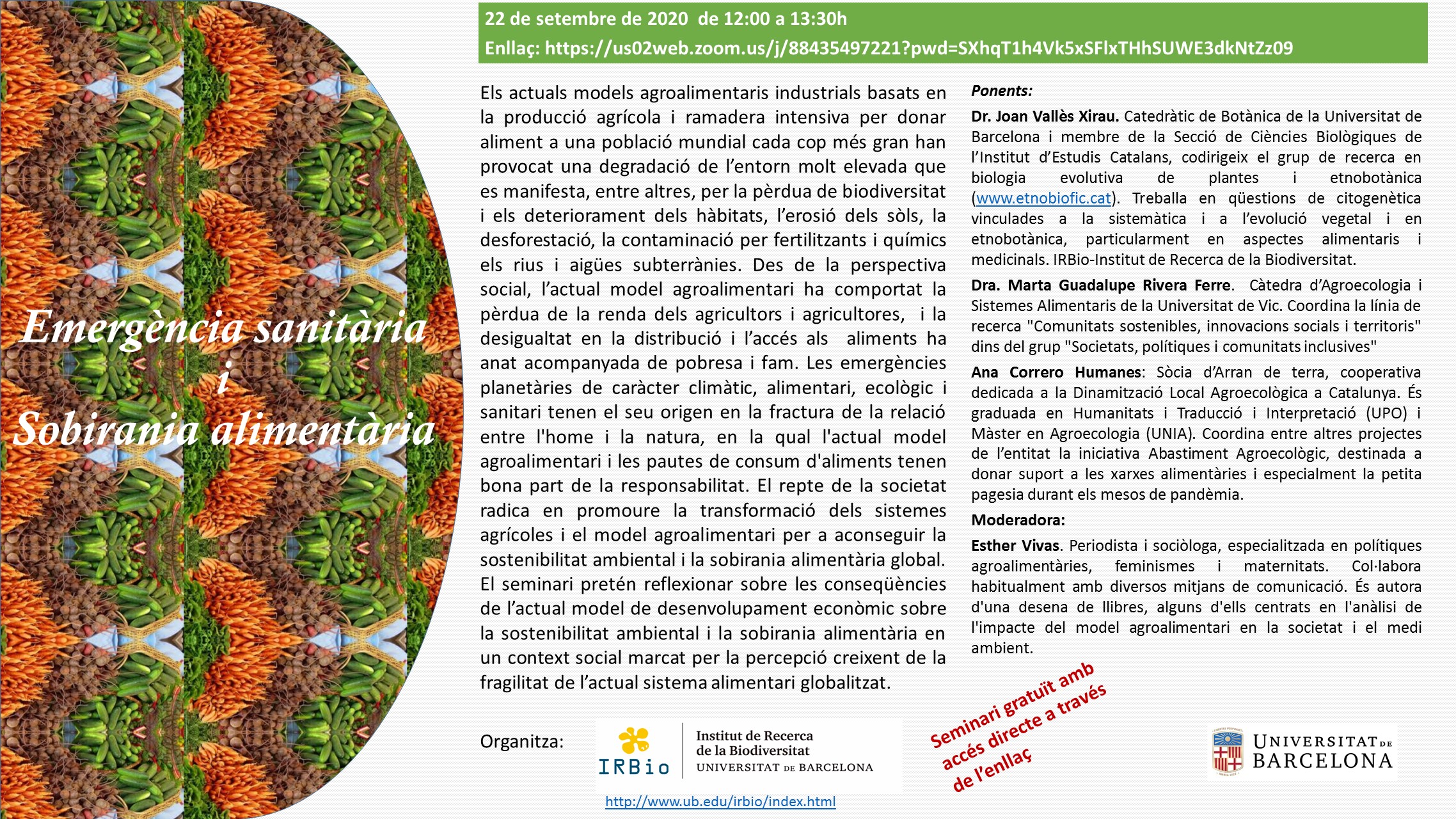Health emergency and food sovereignty

Health emergency and food sovereignty
22th september 2020 from 12:00 to 13:30h
Free webinar:
https://us02web.zoom.us/j/88435497221?pwd=SXhqT1h4Vk5xSFlxTHhSUWE3dkNtZz09
Current industrial agri-food models based on intensive agricultural and livestock production to feed a growing world population have caused a very high degradation of the environment which is manifested, among other things, by the loss of biodiversity and the deterioration of habitats, soil erosion, deforestation, fertilizer and chemical pollution rivers and groundwater. From a social perspective, the current agri-food model has led to a loss of income for farmers, and inequality in distribution and access to food has been accompanied by poverty and hunger. Global climate, food, ecological and health emergencies have their origin in the fracture of the relationship between man and nature, in which the current agri-food model and food consumption patterns have a large part of the responsibility. The challenge for society lies in promoting the transformation of agricultural systems and the agri-food model to achieve environmental sustainability and global food sovereignty. The seminar aims to reflect on the consequences of the current model of economic development on environmental sustainability and food sovereignty in a social context marked by the growing perception of the fragility of the current globalized food system.
Can organic and local farming feed the entire local population?
Does organic production have to occupy more fields / land, so take land in nature, in order to have a high production? How can the increase in ecological fields affect the natural environment?
Would food sovereignty increase or reduce farmers' dependence on market demand? and how does this affect the economy of the farmers themselves?
Should We Learn to Eat grass? Ethnobotany is a thing for our grandparents, or it will be a new reality.
Speakers:
Dr. Joan Vallès Xirau. Professor of Botany at the University of Barcelona and member of the Biological Sciences Section of the Institut d’Estudis Catalans, he co-directs the research group in evolutionary plant biology and ethnobotany (www.etnobiofic.cat). He works on cytogenetics issues related to plant systematics and evolution and ethnobotany, particularly in food and medicinal aspects. IRBio-Biodiversity Research Institute.
Dra. Marta Guadalupe Rivera Ferre. Chair of Agroecology and Food Systems at the University of Vic. Coordinates the research line "Sustainable communities, social innovations and territories" within the group "Societies, policies and inclusive communities".
Ana Correro Humanes. Member of Arran de terra, a cooperative dedicated to Local Agroecological Revitalization in Catalonia. She has a degree in Humanities and Translation and Interpretation (UPO) and a Master's in Agroecology (UNIA). He coordinates, among other projects of the entity, the Agroecological Supply initiative, aimed at supporting food networks and especially the small peasantry during the pandemic months.
Moderator:
Esther Vives. Journalist and sociologist, specializing in agri-food policies, feminism and motherhood. He regularly collaborates with various media. She is the author of a dozen books, some of them focused on the analysis of the impact of the agri-food model on society and the environment. Among these titles we can highlight "The food business. Who controls our food?" (Icaria editorial, 2014); "From the field to the plate. Food production and distribution circuits" (Icaria editorial, 2009) or "Supermarkets, no thanks. Large distribution chains: impacts and alternatives" (Icaria editorial, 2007). Her latest work is "Disobedient Mama. A Feminist Look at Motherhood" (Ara Llibres, 2019).
Can organic and local farming feed the entire local population?
Does organic production have to occupy more fields / land, so take land in nature, in order to have a high production? How can the increase in ecological fields affect the natural environment?
Would food sovereignty increase or reduce farmers' dependence on market demand? and how does this affect the economy of the farmers themselves?
Should We Learn to Eat grass? Ethnobotany is a thing for our grandparents, or it will be a new reality.
Speakers:
Dr. Joan Vallès Xirau. Professor of Botany at the University of Barcelona and member of the Biological Sciences Section of the Institut d’Estudis Catalans, he co-directs the research group in evolutionary plant biology and ethnobotany (www.etnobiofic.cat). He works on cytogenetics issues related to plant systematics and evolution and ethnobotany, particularly in food and medicinal aspects. IRBio-Biodiversity Research Institute.
Dra. Marta Guadalupe Rivera Ferre. Chair of Agroecology and Food Systems at the University of Vic. Coordinates the research line "Sustainable communities, social innovations and territories" within the group "Societies, policies and inclusive communities".
Ana Correro Humanes. Member of Arran de terra, a cooperative dedicated to Local Agroecological Revitalization in Catalonia. She has a degree in Humanities and Translation and Interpretation (UPO) and a Master's in Agroecology (UNIA). He coordinates, among other projects of the entity, the Agroecological Supply initiative, aimed at supporting food networks and especially the small peasantry during the pandemic months.
Moderator:
Esther Vives. Journalist and sociologist, specializing in agri-food policies, feminism and motherhood. He regularly collaborates with various media. She is the author of a dozen books, some of them focused on the analysis of the impact of the agri-food model on society and the environment. Among these titles we can highlight "The food business. Who controls our food?" (Icaria editorial, 2014); "From the field to the plate. Food production and distribution circuits" (Icaria editorial, 2009) or "Supermarkets, no thanks. Large distribution chains: impacts and alternatives" (Icaria editorial, 2007). Her latest work is "Disobedient Mama. A Feminist Look at Motherhood" (Ara Llibres, 2019).